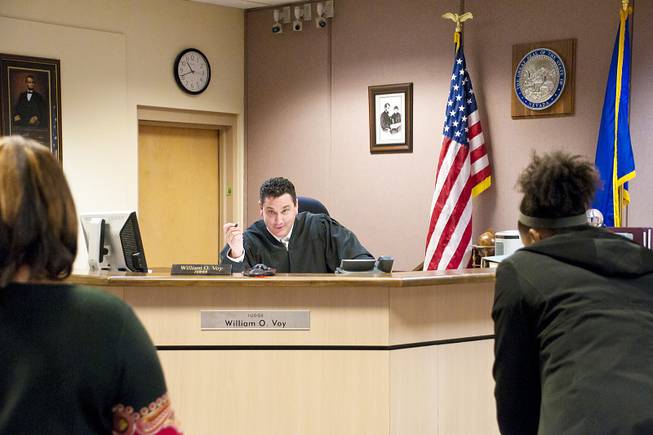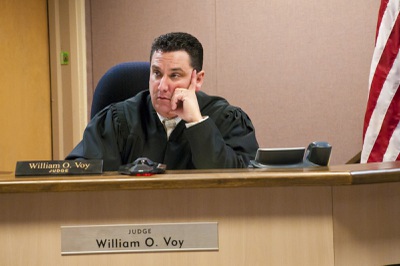
Clark County Family Court Judge William Voy presides during a hearing of juveniles charged with prostitution on Feb. 23, 2011.
Monday, March 7, 2011 | 2 a.m.
Prostitution bill
- Do you support a bill to allow those convicted of prostitution who were also victims of trafficking or involuntary servitude to have their convictions vacated?
- Yes — 77.8%
- No — 22.2%
This poll is closed, see Full Results »
Note: This is not a scientific poll. The results reflect only the opinions of those who chose to participate.

Annie Lobert
Sun Archives
- Man accused of sexual assault, forcing Canadian tourist into prostitution (2-9-11)
- Facing possible life sentence, troubles worsen for alleged pimp (8-8-09)
- The pimp: Was it a role or was it a reality? (8-1-09)
- Pimps, Metro's coming for you (3-20-2009)
- Letters of sorrow and need (12-7-2008)
- Hawking erotic services? Craigslist now has your number (11-29-2008)
- 'John School' teaches men the uglier facts of life (1-6-2008)
- Hands tied on prostitution (9-15-07)
- Mutual misery when daughters disappear (9-24-2006)
Sexually abused as a child and pimped as a teen in Hawaii, Annie Lobert fell into the violent side of prostitution. She was beaten, raped, tied up and more than once had a gun barrel shoved into her mouth.
Lobert said she was convicted of solicitation just once in 25 arrests from ages 19 to 23, but it took seven years to get her record sealed by a judge.
Now she’s opening up about her experiences to help others. The former Las Vegas call girl runs Hookers for Jesus, a faith-based organization in Southern Nevada that helps women escape prostitution. And she supports a proposed state law that would let prostitutes have misdemeanor convictions erased if they can prove they were victims of human trafficking or involuntary servitude.
Supporters of Assembly Bill 6 say that vacating prostitution convictions will help victims get legitimate jobs and heal emotionally without hassling to seal their records.
But Lobert’s support for AB6 comes with a condition.
“It’s great as long as the girls aren’t required to testify against their pimps,” she said. “They most likely won’t testify because they’d be afraid for their lives.”
Sponsored by Assemblyman John Hambrick, R-Las Vegas, AB6 is awaiting a hearing before the Assembly Judiciary Committee along with companion bills the retired federal Secret Service and immigration agent hopes will increase penalties against pimps. Hambrick was drawn to the trafficking issue while serving on the Metro Police Citizen Review Board. He quickly learned how prostitution destroys the spirit of juvenile and adult prostitutes.
“I believe as a society we must address this problem because it is a scourge, a cancer,” he said.
New York last year became the first state to enact a law resembling AB6, and similar legislation is pending in Illinois, Maryland and Pennsylvania. That’s according to Julie Janovsky, senior policy specialist with the Polaris Project, an anti-trafficking organization in Washington. Janovsky helped Hambrick draft AB6.
“If Nevada passes this bill, it would establish a trend in understanding the link between sex trafficking and prostitution,” she said. “This is something that will help victims of trafficking move on with their lives.”
Las Vegas long has been considered a hot spot for prostitution driven by trafficking. Shared Hope International, an advocacy group in Vancouver, Wash., reported that in one month in 2007, more than 400 children were working the streets of Las Vegas as prostitutes. Not surprisingly, Melissa Snow, Shared Hope’s program director, supports AB6.
“You and I know how significant it is to have a prostitution charge on your record,” Snow said. “It has legal and emotional implications. Wiping that label clean gives someone a chance to take the path toward recovery.”
Clark County Family Court Judge William Voy said AB6 would affect women age 18 and older. That’s because he has agreements with the Clark County district attorney’s and public defender’s offices to reduce solicitation convictions of those under 18 to minor nuisance violations that carry probation.
With hearings each Wednesday morning, he sees about 150 cases annually involving those younger than 18. Voy wants the county to spend $725,000 a year — money the county says it doesn’t have — to staff a full-time safe house where juveniles could get counseling, heal emotionally and physically, and break away from their pimps. Like Voy, Las Vegas Municipal Judge Cynthia Leung said she is neutral on AB6 but understands the logic behind the legislation.
Leung conducts the Women in Need specialty court on Thursdays for adult prostitutes seeking treatment for substance abuse financed by trading sex for money. Of hundreds of prostitutes she has seen over three years, just 11 have graduated from the court’s program, which also offers housing and education assistance.
The low success rate, she said, is because most women who participate drop out before completing the court’s program, which can take up to 18 months. They ultimately revert to prostitution, Leung said, because of “their unwillingness to want to change.”
Another problem, Leung said, is finding employers willing to hire those convicted of solicitation. She wants prosecutors to reduce solicitation charges to lesser crimes such as jaywalking.
“What I’m trying to do is get these women to the point where they can get a job,” Leung said. “If they have a record, it’s difficult because that conviction can hurt them.”
If AB6 is approved, Leung said the burden would still be on the women to prove they were trafficking victims. But the ones she sees are virtually all longtime independent operators who either don’t have pimps or aren’t willing to testify that they are victims of trafficking or involuntary servitude. So she’s not sure what effect AB6 will have.
Metro Police made 2,772 solicitation arrests last year. All but 48 involved adults 18 and older. Also, 107 children were apprehended because of possible connections to prostitution, such as being with adult prostitutes. Over the past three years, Metro also has arrested 200 pimps or their associates, including others who help them recruit women.
“Las Vegas is a major pit stop for pimps who are marketing women as prostitutes,” Metro vice Lt. Karen Hughes said. “It’s part of what we call the circuit, along with Seattle, Portland, Miami and Hawaii.”
Women who are forced into prostitution and are new to the profession are commonly referred to as “turnouts.” Hughes described a typical case. A woman comes to Las Vegas in hopes of becoming a stripper. At a friend’s recommendation, she meets a man she thinks will help her get work. She decides to live with him and is befriended by another woman who resides with the same man. The other woman introduces the would-be stripper to prostitution.
The man beats her and forces her to stick with prostitution through intimidation, including threats against family members.
Hughes supports AB6 but said it shouldn’t erase prostitution convictions for those who keep working but haven’t indicated they were forced. “There are women involved in prostitution who say ‘it is my choice,’ ” she said.
Clark County District Attorney David Roger said, “When we bring a case of prostitution, we look beyond the actual case to see if the alleged prostitute is truly a victim. Our goal is to locate the pimps and take them off the streets.”
County Public Defender Phil Kohn, whose office represented 730 women accused of prostitution over the past two years, called AB6 “a great idea that is incredibly insightful” on Hambrick’s part. But Kohn also said the legislation might not help women who were trafficked as juveniles but who continued to be prostitutes as adults.
“How do you prove that a 23-year-old prostitute was trafficked when she was 15?” Kohn said. “Assuming she may have used a lot of drugs at the time, she probably wouldn’t be a good historian.”
UNLV criminal justice professor Alexis Kennedy said that instead of approving AB6, Nevada should adopt the Swedish model in which only the customers of prostitutes or pimps are arrested. Under reforms Sweden enacted in 1999, all prostitutes are assumed to be victims.
In Nevada, figures from 2009 showed that 3,555 women were arrested statewide for prostitution, compared with 459 men apprehended for prostitution-related crimes.
What this shows, Kennedy said, “is the underlying victimization of the sellers. They’re already experiencing hardship.”


Join the Discussion:
Check this out for a full explanation of our conversion to the LiveFyre commenting system and instructions on how to sign up for an account.
Full comments policy